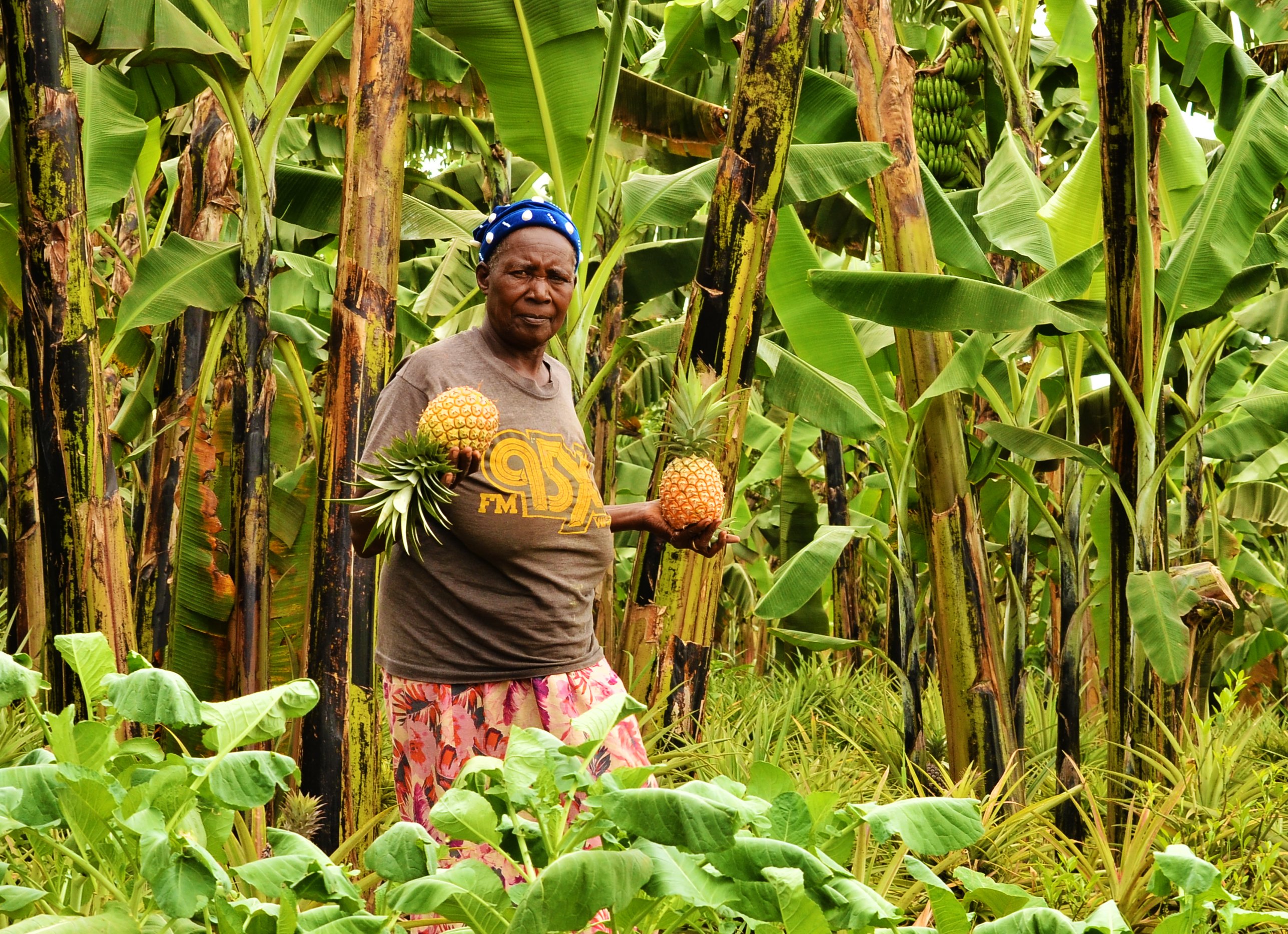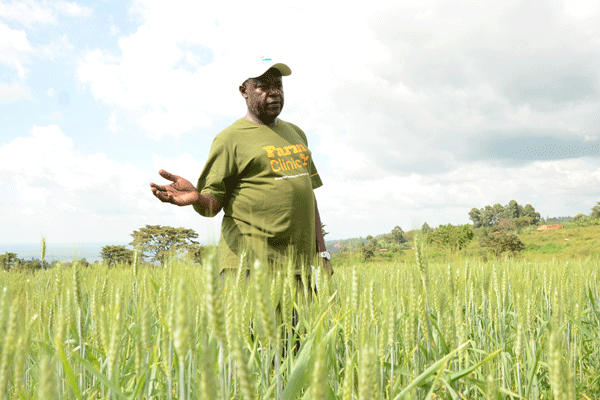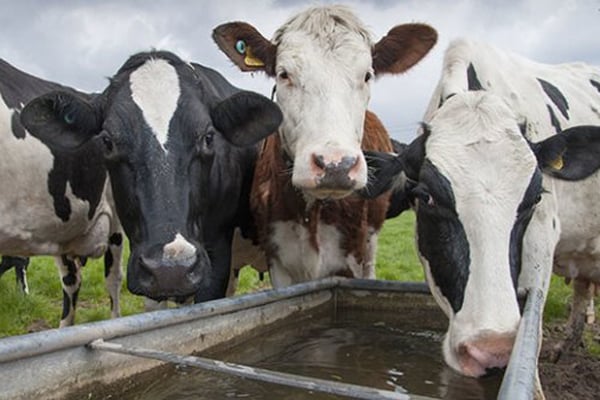Prime
Climate-smart agriculture is key for building resilient food systems

Solutions and policies must address the needs of smallholder farmers to build resilient food systems. Photo/George Katongole
What you need to know:
- As East Africa focuses on building resilient food systems, climate-smart agriculture practices, access to quality fertilisers, and robust research efforts are proving to be vital components.
To ensure food security and sustainability, East Africa is placing a strong emphasis on developing resilient food systems.
However, the agri-food system in this region is facing formidable challenges, even within the context of the African continent.
Surprisingly, despite comprising less than 25 percent of the total population, Eastern Africa accounts for over 50 per cent of the chronically undernourished people in Africa.
The agri-food systems encompass spans from cultivation and harvesting to processing, packaging, transportation, distribution, trade, consumption, and waste management.
Navigating this intricate web of activities requires a holistic approach that addresses the multiple stages and stakeholders involved.
The World Food Programme is advocating for the transformation of agri-food systems, particularly in countries and regions grappling with food insecurity and malnutrition.
This is significant for Africa, which has experienced an increase of 50 million hungry people since 2014, bringing the total to 250 million individuals, almost one-fifth of the population.
In this journey, climate-smart agriculture practices, access to quality fertilisers, and robust research efforts are emerging as pivotal elements.
Experts and organisations in the region are dedicating their efforts to address the challenges and promote sustainable solutions for building resilient food systems.
Climate-Smart Agriculture
At the forefront of building resilient food systems is the adoption of climate-smart agriculture practices.
Dr John Jagwe, the Country Director of the Alliance for a Green Revolution in Africa (AGRA), emphasises the significance of implementing innovative approaches.
These practices focus on enhancing productivity while conserving natural resources, mitigating the impacts of climate change, and promoting sustainable farming methods.
Practices such as agroforestry, conservation tillage, and integrated pest management help protect soil health, prevent erosion, and promote biodiversity.
As weather patterns become increasingly unpredictable, farmers need to adapt their practices to minimise crop losses and ensure food security.
This may involve diversifying cropping systems, selecting climate-resilient crop varieties, and adopting innovative water management techniques like rainwater harvesting and efficient irrigation systems.
“Embracing sustainable farming methods is vital towards achieving climate-smart agriculture. By reducing reliance on synthetic pesticides and fertilisers and transitioning to organic or low-input farming systems, we can cultivate a healthier and more resilient food system,” Dr Jagwe says.
The future of fertilisers
Fertiliser uptake in Uganda has been relatively low compared to other countries in the region, with an annual inorganic fertiliser application of only 1.8kg per hectare, according to the International Food Policy Research Institute.
This situation stems from various challenges, including limited access to quality fertilisers, high costs, low awareness among farmers, and issues in the agro-input supply chain.
Limited availability and distribution networks, particularly in remote rural areas, hinder farmers from procuring fertilisers when needed.
Additionally, the variation in the quality of fertilisers in the market poses challenges for farmers in selecting suitable and effective products.
Cost is another barrier to fertiliser uptake in Uganda, as fertilisers can be relatively expensive, making them unaffordable for smallholder farmers operating on tight budgets.
Efforts have been made by the government, non-governmental organisations, and development partners to address these challenges and promote fertiliser uptake.
Initiatives include the establishment of fertiliser subsidy programs, the improvement of agro-input distribution networks, and the provision of training and extension services to farmers.
Dr David Bazilwane, the Country Manager of TradeMark Africa, emphasizes the significance of the future of fertilisers and agro-inputs in Africa, highlighting the role of the African Fertilizer and Agribusiness Partnership (AFAP) in this regard.
He underlines that fertilisers play a vital role in modern agriculture by providing essential nutrients to crops, improving soil fertility, and boosting yields.
“Promoting responsible fertiliser use is paramount in minimising environmental impact and maximising benefits for farmers,” Bazilwane says.
AFAP plays a crucial role in promoting responsible fertiliser use and sustainable agro-input practices in Africa.
Collaborating with various stakeholders, including governments, industry players, research institutions, and farmers, AFAP strives to strengthen the agro-input supply chain.
This involves supporting the production, distribution, and marketing of quality fertilisers and agro-inputs, ensuring their availability and accessibility to smallholder farmers.
To-date, AFAP has established a customer base of 7.5 million smallholder farmers across eight African countries, including Uganda, by facilitating investment and encouraging public-private partnerships.
Evidence-based interventions
Florence Nakazi, a research analyst at the Economic Policy Research Centre (EPRC), emphasises the crucial role of data and evidence-based policy-making in building resilient food systems.
“Comprehensive research on market dynamics, farmer needs, and consumer preferences provides valuable insights that drive effective interventions and investments in the agriculture sector,” Nakazi says.
She says policymakers can leverage this information to devise strategies that address challenges at every stage of the food system, ensuring its stability and adaptability.
Trends and demand
Nakazi highlights the importance of continuously monitoring and analysing trends in supply and demand, price fluctuations, and market preferences.
By staying informed about market dynamics, policymakers can make well-informed decisions regarding production levels, storage and distribution infrastructure, and market access.
This enables them to respond proactively to changing market conditions and ensure a steady supply of food.
Farmer needs
To build resilient food systems, it is vital to understand the needs of farmers. Nakazi emphasises the significance of research that assesses the challenges faced by smallholder farmers, such as access to inputs, credit, and extension services.
Addressing these challenges empowers farmers to increase their productivity and contribute to a more resilient food system.
Consumer preferences
Nakazi underscores the importance of research that identifies consumer trends, dietary preferences, and demands for quality and safety.
Understanding consumer preferences allows policymakers to support value addition initiatives, develop market linkages, and promote sustainable and nutritious food choices.
A holistic approach
She stresses the significance of adopting a holistic approach that addresses challenges at all levels of the food system. This encompasses issues related to production, processing, distribution, and market access.
This holistic perspective allows for the implementation of integrated strategies that strengthen the resilience of the entire food system.
Partnerships
Collaborative efforts from experts, organisations such as AGRA and AFAP, and various stakeholders are driving the resilience of East Africa’s food systems.
By fostering innovation, knowledge-sharing, and policy support, these partnerships are shaping the future of agriculture in the region.




